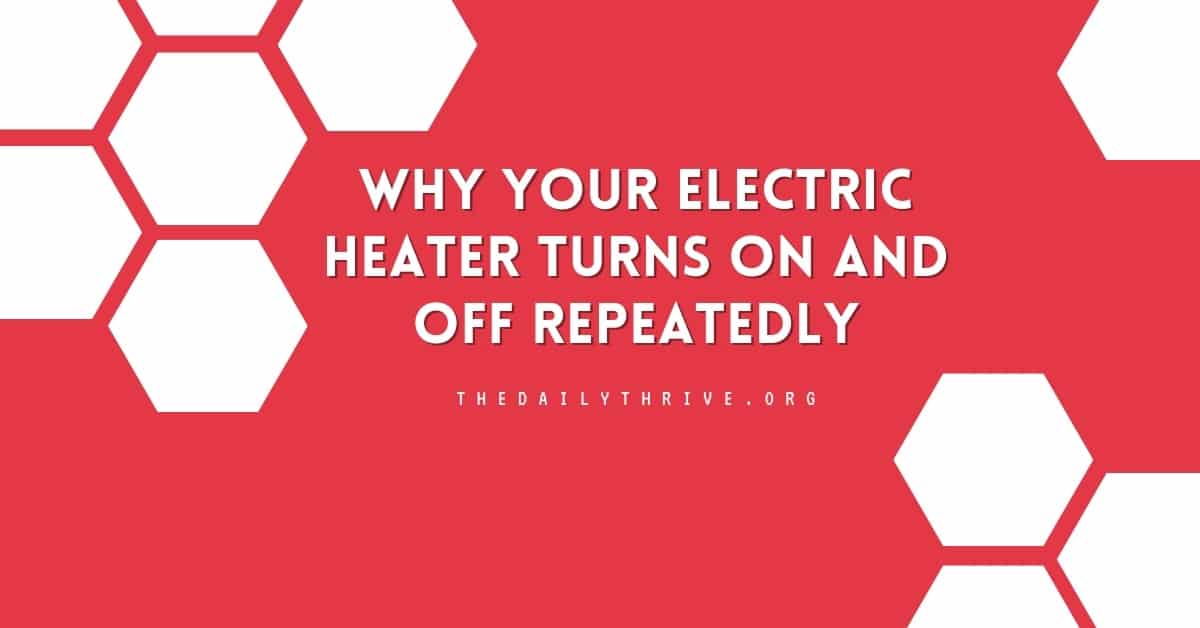It’s a chilly evening, and you rely on your trusty electric heater to keep you warm. But instead of a consistent stream of warmth, your heater seems to have developed a mind of its own, turning on and off repeatedly.
This erratic behavior isn’t just inconvenient; it could signify a deeper problem. It’s essential to diagnose and address this electric heater issue for your comfort, safety, and efficiency.
Reasons Your Electric Heater Keeps Turning Off
Electric heaters are generally reliable, but they can develop quirks like all appliances. Here are the common reasons your heater might be cycling on and off too frequently:
- Thermostat Issues
Every heater has a thermostat that senses the ambient temperature and turns the heater on or off accordingly. If this thermostat gives incorrect readings, it can cause the heater to shut off before reaching the desired warmth. This can often be attributed to its placement. The readings may be skewed if it’s near a window or another heat source. - Overheating
Safety is paramount. Most modern electric heaters are designed with a safety feature that turns them off if they start to overheat. Overheating can occur if the air filter is blocked, restricting airflow. Accumulation of dust or the presence of foreign objects can also lead to overheating. Regularly inspecting and cleaning your heater can help prevent this. - Electrical Issues
A tripped breaker or a blown fuse can also be the culprit. Faulty wiring, especially in older homes, can cause intermittent disruptions. Regularly check your electric panel and ensure all connections are secure and corrosion-free. - Faulty Sensors
In addition to thermostats, heaters have other sensors to detect temperature changes and airflow. If these malfunction, they can cause the heater to act unpredictably. - Wear and Tear
Like all things, heaters, too, have a lifespan. An older unit, especially one that hasn’t been regularly serviced, can have multiple parts close to failing. Regular maintenance can identify and rectify these weak points before they become problematic.
Electric Heater Safety Tips
Safety is always something to maintain, especially when dealing with electric appliances. Here are some measures to ensure you’re using your electric heater safely:
- Regular Maintenance
Schedule routine check-ups for your electric heater. Cleaning and replacing filters, inspecting wires and connections, and ensuring the unit runs smoothly can prevent most problems from occurring. - Proper Placement
Position your heater in a location where it’s away from flammable items such as curtains or rugs. Ensure there’s enough space around the heater, allowing for proper airflow. This not only ensures safety but also helps the unit operate efficiently. - Using the Right Extension Cords
If you must use an extension cord, make sure it’s heavy-duty. Regular cords can overheat and become a fire hazard. Also, refrain from overloading your circuits; spread out your appliances if necessary. - Monitoring
Keep an eye (and ear) on your heater. If you notice unusual sounds, smells, or behaviors, turn it off immediately and seek professional advice. - Child and Pet Safety
Position your heater where children and pets can’t reach or knock it over. Educating your family about the potential dangers is also crucial. This includes not drying clothes on the heater or leaving it unattended.
Replace or Repair an Electric Heater That Keeps Shutting Off
Your heater’s unpredictable behavior begs the question: should you repair or replace it?
When to Repair?
Suppose the heater is relatively new, and the issue seems minor (like a faulty thermostat or sensor). In that case, it’s often more cost-effective to repair. Regular maintenance can also identify and rectify issues, prolonging your heater’s lifespan.
When to Replace?
Consider replacement if your unit is older and frequently malfunctions. Modern heaters are not only more reliable but often more energy-efficient. This means that while you might spend more upfront on a new unit, you’ll save on energy bills in the long run.
If you’re ever in doubt, consult with a professional HVAC technician. Their experience and expertise can quickly diagnose issues and provide recommendations. This ensures your safety and can save money in the long run.
An electric heater turning on and off repeatedly isn’t just an annoyance; it’s a call to action. You can ensure a warm and safe environment by understanding the potential reasons and implementing safety measures. Regular maintenance and professional consultation are your best allies in this. Remember, it’s always better to be proactive than reactive regarding the safety and efficiency of your appliances.






